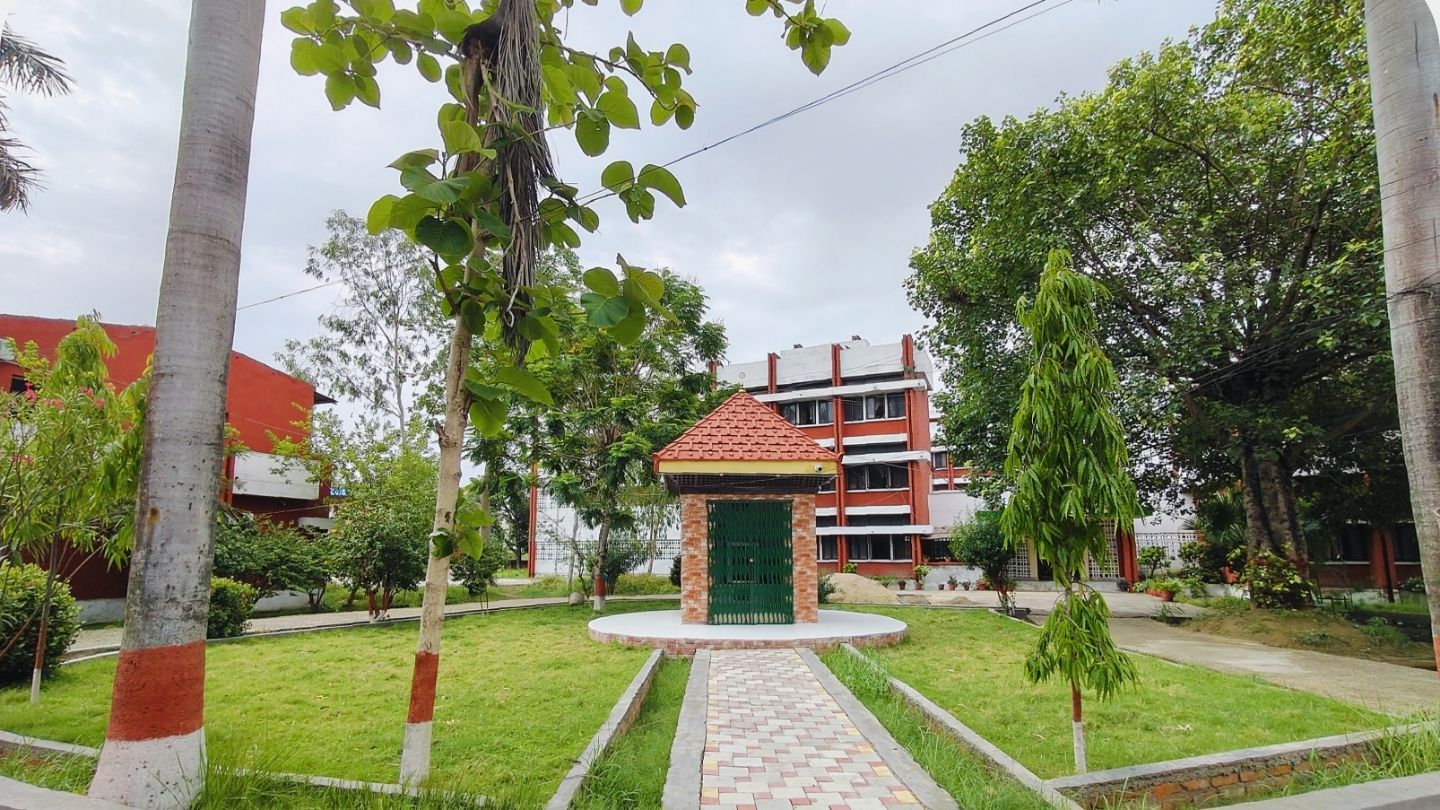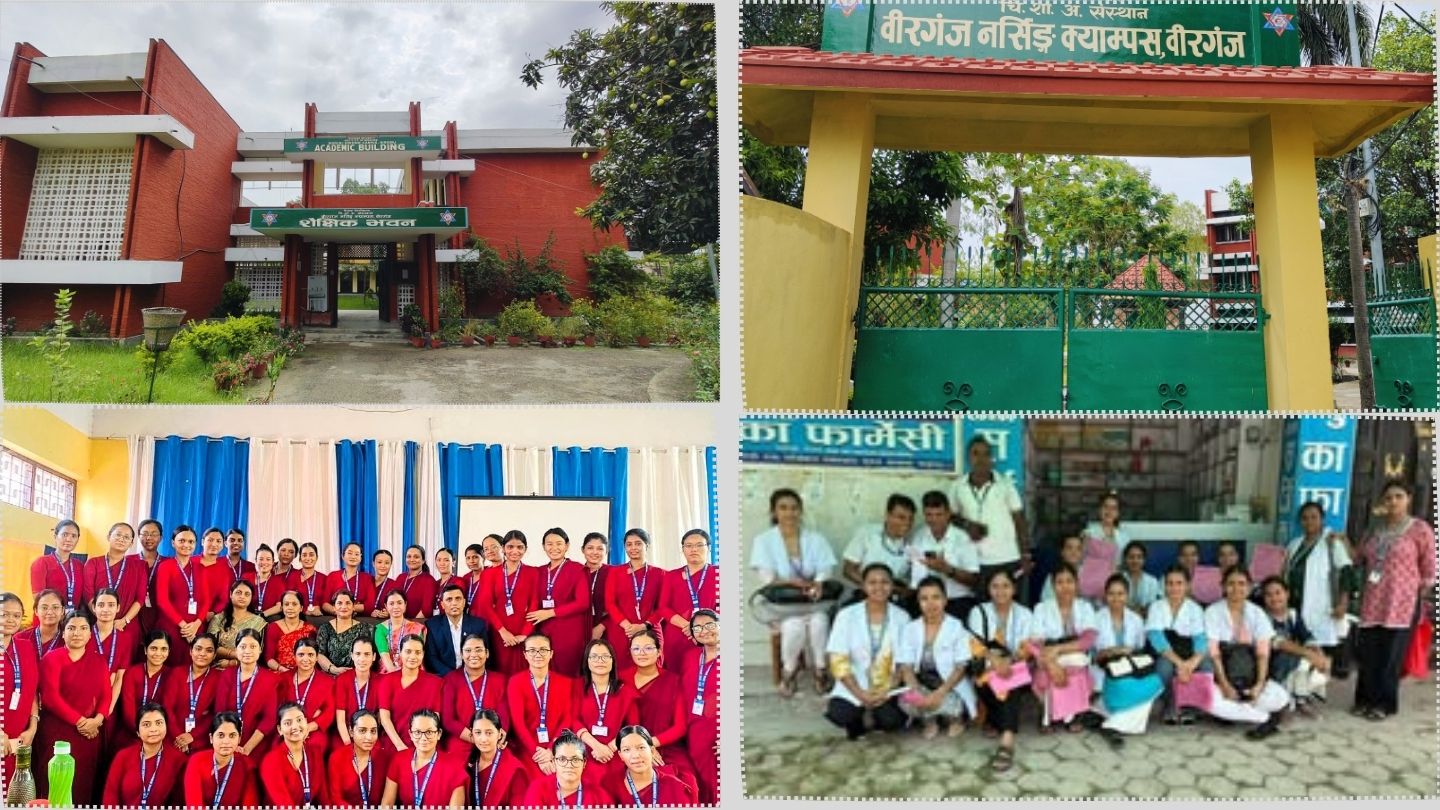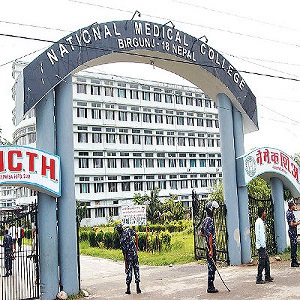Overview
Birgunj Nursing Campus (BNC) is a constituent campus of Tribhuvan University, Institute of Medicine (TU-IOM), located in Birgunj, Madhesh Province, Nepal. The campus runs undergraduate nursing programs that serve students from across Nepal and abroad. Key study options include the Bachelor of Science in Nursing (BSc Nursing) and the Bachelor of Nursing Science (BNS). Within TU-IOM’s network, BNC is noted for its public mission, clinical exposure across district and regional hospitals, and a steady pipeline of nursing graduates that support Nepal’s health system.
From its early years, the campus has grown step by step—moving from assistant-level training to full undergraduate degrees. Today, BNC focuses on strong clinical practice, community outreach, and academic standards that align with TU-IOM policies and Nepal Nursing Council (NNC) requirements.
Quick Highlights
-
Location: Birgunj, Madhesh Province, Nepal
-
Affiliation: Tribhuvan University, Institute of Medicine (TU-IOM)
-
Nature: Government constituent nursing campus
-
Current Programs: BSc Nursing (4 years), BNS (3 years, post-basic)
-
BSc Nursing Intake: 30 seats
-
BNS Intake: 40 seats (Adult Nursing 25, Community Nursing 10, Pediatric Nursing 5)
-
Clinical Linkages: Primary health care centers, district hospitals, and regional hospitals across multiple districts
-
Legacy Programs: PCL Nursing ran for 33 batches; phased out in 2077 BS
-
Campus Vision: Prepare nursing personnel with strong academic standards to meet Nepal’s health goals and the Sustainable Development Goals (SDGs)
 Academic Programs Offered
Academic Programs Offered
Bachelor of Science in Nursing (BSc Nursing)
BSc Nursing is a four-year undergraduate program aimed at preparing professional nurses for hospital and community settings. The curriculum builds core knowledge in health sciences, nursing theory and practice, leadership, education, and research. Graduates move into roles in hospitals, primary care, public health programs, and teaching.
Duration and Structure
-
Four academic years with a blend of classroom learning, laboratory practice, simulation, and clinical rotations.
-
Progressive exposure: early fundamentals, followed by adult and geriatric care, psychiatric nursing, midwifery, child health, family and reproductive health, management, education, and research.
Typical Course Components
-
Integrated Health Sciences (theory and practical)
-
Fundamentals of Nursing (theory and practical)
-
Community Health Nursing I (theory and practical)
-
Nutrition and Diet Therapy
-
Adult and Geriatric Nursing (theory and clinical)
-
Psychiatric Nursing (theory and clinical)
-
Midwifery Nursing I & II (theory and clinical)
-
Child Health Nursing (theory and clinical)
-
Family & Reproductive Health Nursing (theory and clinical)
-
Management & Health Economics, Educational Science, Research & Biostatistics, Research Practicum
Key Learning Outcomes
By graduation, students should be able to:
-
Plan and deliver safe, person-centered care in hospital and community settings.
-
Communicate effectively with clients, families, and health teams.
-
Apply nursing procedures and clinical decision-making with accuracy.
-
Use the nursing process to provide individualized care.
-
Coordinate and supervise care as a junior leader when assigned.
-
Teach basic health topics and support health education activities.
-
Understand social and cultural factors that shape health behaviors.
-
Engage in entry-level research and quality-improvement activities.
Intake and Seats
-
BSc Nursing: 30 seats
Bachelor of Nursing Science (BNS)
BNS is a three-year post-basic bachelor’s program for registered PCL Nursing graduates. The degree deepens professional competence with focused pathways in Adult Health Nursing, Community Health Nursing, or Child Health Nursing. Teaching-learning activities blend advanced theory with extensive clinical responsibilities and community postings.
Duration and Specializations
-
Three academic years
-
Specializations and indicative seat distribution:
-
Adult Health Nursing — 25 seats
-
Community Health Nursing — 10 seats
-
Pediatric (Child Health) Nursing — 5 seats
-
-
Total BNS intake: 40 seats
Focus Areas
-
Advanced assessment and care planning in the chosen specialty
-
Leadership, supervision, and preceptorship in clinical settings
-
Teaching and mentoring of junior students in skills labs and wards
-
Project work, research methods, and professional writing
Graduate Profile
BNS graduates are prepared for senior clinical roles, ward and unit management, community programming, education at foundational levels, and participation in research and service audits.
Admission Process
BNC follows TU-IOM admission rules. Applicants must consult the most recent TU-IOM admission notice and prospectus for exact dates, quotas, and any policy updates.
BSc Nursing — Eligibility and Steps
Eligibility
-
Completed 10+2 Science or Intermediate of Science with Biology, minimum 50% aggregate (or as specified by the latest TU-IOM notice).
-
Female applicant (as per prevailing program criteria under TU-IOM).
-
Age limit and health fitness as per TU-IOM rules.
-
Must pass the TU-IOM entrance examination for BSc Nursing.
Application Steps
-
Submit the online application form through the TU-IOM portal when announced.
-
Sit for the entrance examination at designated centers.
-
Secure a place on the merit list; selection follows TU-IOM rules.
-
Complete document verification and medical fitness.
-
Enroll at BNC within the deadline issued in the admission notice.
Documents Typically Required
-
Academic transcripts and certificates (10+2/Intermediate with Biology)
-
Citizenship certificate or passport (as applicable)
-
Recent photographs
-
Entrance examination admit card and score sheet
-
Other items as specified in the current TU-IOM notice
BNS — Eligibility and Steps
Eligibility
-
PCL Nursing (Staff Nurse) with Nepal Nursing Council (NNC) registration.
-
Minimum practice experience (usually two years) as specified by TU-IOM.
-
Must pass the TU-IOM entrance examination for BNS.
-
Other criteria (age, health) per the latest notice.
Application Steps
-
Apply online via the TU-IOM portal for BNS.
-
Appear in the entrance examination.
-
Attend counseling for specialty placement based on merit and seat availability.
-
Complete verification, health clearance, and enrollment.
Advisory for All Applicants
Admission rules, quotas, fee structures, and calendar details are subject to annual updates. Always follow the current TU-IOM admission circular for final guidance.
Teaching Faculty and Learning Methodology
BNC’s teaching team includes experienced nurse educators and clinical preceptors. Classroom sessions focus on core concepts and current practices. Skills labs allow step-by-step practice before clinical placement.
Small-group tutorials, case discussions, clinical conferences, and journal reviews help students connect theory with real-world care.
Clinical learning happens in phased layers: observation, supervised procedures, independent assignments under supervision, and team-based care plans.
Students rotate through medical-surgical wards, maternity units, pediatric units, psychiatric settings, community health posts, and outreach clinics. Educators emphasize safe practice, accurate documentation, teamwork, and respectful communication.
Assessment combines internal evaluation (assignments, practicals, OSCEs, viva) and final examinations per TU-IOM rules. Research and community projects build inquiry skills and habit of evidence-based practice.

Infrastructure and Learning Facilities
-
Classrooms and Seminar Rooms: Adequate seating, projection support, whiteboards, and provision for demonstrations.
-
Nursing Skill Labs: Fundamentals lab for procedures and simulation; dedicated areas for midwifery, pediatric practice, and community demonstrations.
-
Basic Science Support: Anatomy, physiology, biochemistry, pathology, pharmacology, and microbiology learning resources as per curriculum needs.
-
Library and Study Spaces: Core textbooks, reference materials, journals, past question papers, and reading areas.
-
ICT Access: Computer access and internet connectivity to support assignments, literature searches, and online learning.
-
Clinical Platforms: Teaching-district and hospital linkages with primary health care centers, district hospitals, and regional hospitals.
-
Hostels and Student Services: Accommodation support (where available), counseling access, and guidance for clinical postings.
-
Ongoing Upgrades: The campus plans phased improvements, including classrooms, labs, skill stations, conference space, and utilities to support teaching and clinical preparation.
Student Life and Campus Experience
Life at BNC centers on practical learning, peer support, and community service. Students spend meaningful time in labs and hospitals, then regroup on campus for debriefs, tutorials, and faculty meetings. Study groups, exam prep circles, and mentorship by seniors are common.
The campus encourages healthy routines, time management, and professional etiquette—traits that matter in busy wards and community clinics.
Students also take part in health awareness events, outreach camps, and special observances like International Nurses Day. Off the ward, informal activities and cultural programs help balance study with social connection.
Extracurricular Activities (ECA)
-
Health Camps and Outreach: Maternal and child health days, immunization support, school health programs, and sanitation drives.
-
Awareness Programs: Sessions on nutrition, reproductive health, mental health, and non-communicable diseases during community postings.
-
Student Clubs and Sports: Sports days, debates, and cultural events encourage teamwork and wellbeing.
-
Academic Enrichment: Journal clubs, clinical case presentations, and poster sessions.
Scholarships and Financial Support
As a government constituent campus, BNC follows TU-IOM rules on seat categories and any scholarships that may be available in a given cycle.
Students should track the current admission notice for information on:
-
Merit-based placements as per the entrance examination
-
Any reserved categories as defined in the annual policy
-
Government or province-level support schemes that may apply in a given year
-
Internal awards, if announced, for academic performance or community service
Prospective students are encouraged to prepare early—keep documents ready, follow deadlines, and consult the campus or TU-IOM portal for updates.
Achievements and Institutional Milestones
-
Legacy and Evolution: The campus began with assistant-level training (AHW) and, in 2038 BS, moved to Proficiency Certificate Level (Health Assistant).
-
PCL Nursing Track Record: PCL Nursing started in 2043 BS and ran for 33 batches before phase-out in 2077 BS, reflecting national policy shifts toward degree pathways.
-
Undergraduate Expansion:
-
BN (2-year) started in 2068 BS with 20 seats (major in Hospital Nursing).
-
BNS (3-year) followed with 20 seats, later expanded to 40 seats allocated across Adult, Community, and Pediatric Nursing.
-
BSc Nursing began in 2077 BS with 30 seats.
-
-
Regional Role: BNC continues to serve as the government nursing campus in Madhesh Province, contributing to district-level health services through clinical education and outreach.
-
Academic Development: Continuous refinement of labs, simulation, and clinical affiliations to align with TU-IOM standards and national priorities.
Why Choose This Institution?
-
Public Mission and Access: As a TU-IOM constituent campus, BNC offers public-sector nursing education grounded in national health priorities.
-
Clinical Breadth: Learning takes place across various levels of care—primary centers, district hospitals, and regional hospitals—exposing students to a wide range of conditions.
-
Skilled Faculty and Mentorship: Educators combine classroom instruction with bedside teaching, case reviews, and supportive feedback.
-
Community Orientation: Outreach activities and postings help students understand public health challenges and local needs.
-
Clear Pathways After Graduation: Graduates progress into hospital roles, community programs, teaching positions, and, with experience and further study, senior clinical or managerial posts.
-
Academic Continuity: A campus history that moved from assistant training to undergraduate degrees shows long-term commitment to nursing education.
Conclusion
Birgunj Nursing Campus offers structured undergraduate nursing education with strong clinical grounding and community links. The BSc Nursing program prepares graduates for hospital and community roles, while the BNS program advances registered nurses into specialty practice and leadership tracks. With its public mandate, TU affiliation, and service orientation, the campus remains a practical choice for students who want to build a nursing career in Nepal while keeping doors open for future study and global opportunities.
Prospective applicants should follow the current TU-IOM admission notice for exact timelines, eligibility details, and any policy updates on seats, categories, or fees. Early preparation—document readiness, entrance exam planning, and timely application—helps secure a place in the program that fits your goals.
Contact Birgunj Nursing Campus's administrative office for detailed information on the course, admissions, location, fees, scholarships, facilities, counseling, or eligibility.














You need to login to comment.